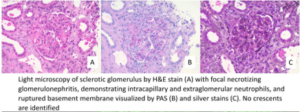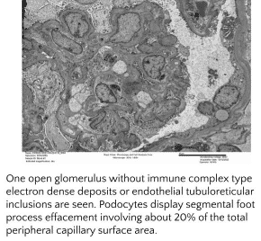Renal Limited Anti-Neutrophil Cytoplasmic Antibody Associated Vasculitis: A Case Report
Lydie Nengue1, Rameez Rao1, Viresh Monhanlal2, Valeria Cipolla Baumler1, Azeem Khan3, Steve J Carlan4*
1Department of Internal Medicine, USA
2Department of Nephrology, USA
3Department of Pathology, USA
4Division of Academic Affairs and Research, USA
*Correspondence author: Steve J Carlan, Division of Academic Affairs and Research, Orlando, Florida, USA; Email: [email protected]
Published Date: 22-01-2024
Copyright© 2024 by Carlan SJ, et al. All rights reserved. This is an open access article distributed under the terms of the Creative Commons Attribution License, which permits unrestricted use, distribution, and reproduction in any medium, provided the original author and source are credited.
| Received 25 Dec, 2023 | Accepted 15 Jan, 2024 | Published 22 Jan, 2024 |
Abstract
Background: Renal Limited Vasculitis (RLV) is a localized autoimmune vascular inflammatory disorder that is part of the Pauci Immune Glomerulonephritis (PIGN) spectrum. Over 90% of PIGN patients have circulating Anti-Neutrophil Cytoplasmic Antibodies (ANCA Ab). Anti-Neutrophil Cytoplasmic Antibody (ANCA) associated vasculitides are a heterogeneous group of multisystemic autoimmune disorders with distinct pathological findings. They are characterized by widespread inflammation of vessels according to their size, their location, and their serotypes based on the presence or absence of ANCA antibodies, namely Myeloperoxidase (MPO-ANCA), Proteinase-3 (PR3-ANCA) or simply ANCA negative, if no antibodies are found. RLV is characterized by antibody positivity to myeloperoxidase in the majority of cases.
Case Report: A 77-year-old Caucasian female was admitted with altered mental status and laboratory evidence of renal function compromise consistent with non-oliguric acute renal failure. Imaging and renal biopsy resulted in a diagnosis of pauci-immune glomerulonephritis consistent with MPO-ANCA vasculitis with a subtype that was associated with necrotizing arteritis, a severe form of the disease. She was placed on hemodialysis, intravenous cyclophosphamide, and oral prednisone, and entered remission.
Conclusion: A high level of suspicion and familiarity with clinical signs and symptoms are critical in distinguishing primary RPGN subtypes from other types of ANCA-associated small vessel vasculitis. If left untreated, renal limited vasculitis can progress to widespread systemic involvement and become fatal.
Keywords: ANCA Associated Vasculitis; Renal Limited Vasculitis; Rapidly Progressive Glomerulonephritis; Single Organ Vasculitis





